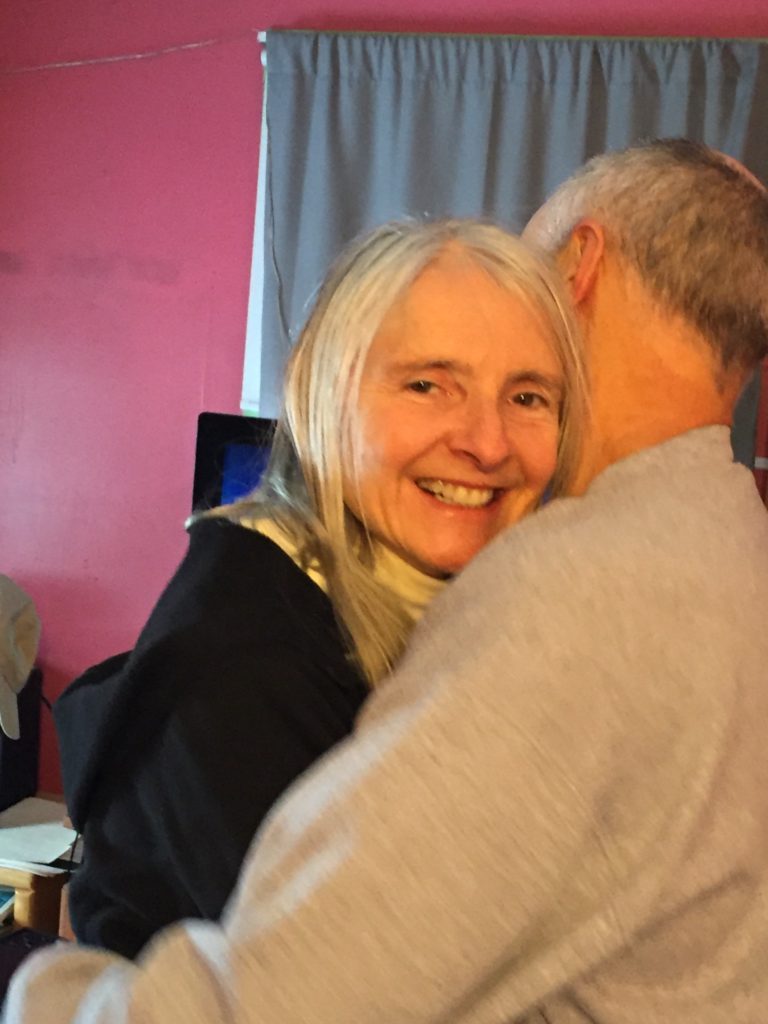As I laid awake, victim of something I ate, I wondered if Cindy would also become victim to the same fate. I also wondered how I would know if she did. Her communication skills are limited to facial expressions. These are tricky to decipher during the day; at night they are invisible.
Complicating this further is Cindy’s nature. There are two types of people whose ailments are tough to gauge: stoics and hypochondriacs. Cindy is a stoic in regards to physical ailments, a necessity for a long distance backpacker.
That leaves me to care for her based mainly on faith in what I am doing, my knowledge of how to live well. This comes too late to recover from dementia, but not for warding off physical afflictions that typically accompany that disease. I know that she does not have bed sores or is starving, but she likely has had stomach aches and headaches without me knowing for sure.
As I continued staring through the darkness towards the ceiling, the story behind our private joke to “suck it up” came to mind. In our first year of marriage I spent a day lying around in bed, feeling lethargic and voicing my feelings to that effect. Cindy the stoic gave me a stern warning: “Suck it up!”
Granted, there are more wimps among males than females, with no menstrual cycles or childbearing to condition us otherwise, but I’m not really a wimpy guy. I’m a long distance backpacker like Cindy. I have hiked many 20+ mile days with 60+ pound packs and a wide variety of injuries and illnesses. I felt a little indignant at being told to “Suck it up!”
I gave the best defense of myself possible. The next time I went to the bathroom I peed blood, revealing that I had a urinary tract infection. Hah! That episode was one of the best things to happen to me in our marriage. Cindy never told me to “suck it up” ever again. On the other hand, I’ve seized numerous opportunities to rib her good-naturedly about how I was once so “unjustly chastised,” capitalizing on a boon most husbands only can envy.
To fall back asleep I “practice” a guitar lick in my head. Soon my mind drifts to reflections on my recent transformation. I was born with an egalitarian faith. I believed we all can be compassionate and responsible for each other, we all can live a contented life, even before research and circumstances led me to understand that these are natural and healthy traits. This attitude served my social life well, leading to “we are all in this together” camaraderie.
With that in mind I used to do things with the intent to empower others, such as organize long distance hikes which formed “we are all in this together’ societies. As a parent I attempted to teach to fish rather than give a fish, ask questions rather than give answers. The latter used to annoy my kids when they approached me with school work, but they ended up valuing their responsibility and independence.
The stillness of the night now interrupts my thoughts with a disturbing reality. Cindy’s body has not twitched for awhile. This could be great news, she is sleeping peacefully, or the ultimate bad news. I have experienced enough false alarms to assume the positive, but now my mind is on alert for detecting Cindy’s next movement.
Ah, yes, my transformation. My egalitarian faith has been challenged, if not quite shattered, by Cindy’s condition. Not everyone can be compassionate, responsible or content on their own. Some need a little help from others, some need a lot of help. As a caregiver I have transformed into “giving a fish.” I have swapped fraternal camaraderie for paternal nurturing. This transformation is particularly evident in the types of hugs I give now, not just for Cindy but for everyone. I enjoy this new type of hug.
Is this transformation for better or worse? Neither, I suppose, just different. I used to organize long distance hikes with goals of camaraderie and empowerment. Now I look forward most to someday giving physically disabled people pedicab rides. Some people can benefit more from a long distance hike, some people can benefit more from a pedicab ride.
Movement from my partner breaks the stillness. For so long Cindy was my best friend, my equal in everything from living well to stoicism. I still think of her as such, but now I care for her as my helpless child instead. I am relieved by her movement and throw my arm over her in a nurturing gesture. I do this more for myself, as I hope she can continue sleeping peacefully. I merely am accepting my transformation.


Profound.
I love the picture – Cindy’s beautiful smile in response to your voice and hugs, but sometimes shared! I treasure her smiles! XO
Thanks for continuing to visit us!
Cindy and Kirk –
I think of you both often, We’ve known each other for so many years when Lisa (Cindy’s sister) and David (my brother) started dating and eventually got married. You are very strong people and I admire you both so much. I wish things were different and that we got to know you better.
You are in my thoughts and prayers and I only wish you the best. I have been want to reach out to you for a long time and have no excuse why I haven’t. For that I am sorry. P
Thank you for thinking about us and reaching out. Say “hi” to David and his family for us. Live well.